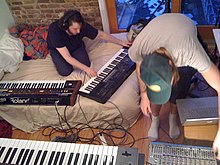
Simian Mobile Disco are an English electronic music duo and production team, formed in 2003 by James Ford and Jas Shaw of the band Simian. Musically, they are known for their analogue production. Ford is also known for his production work.
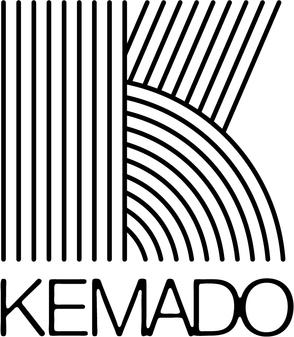
Kemado Records is an American record label based in New York City founded in 2002 by Andrés Santo Domingo and Tom Clapp.
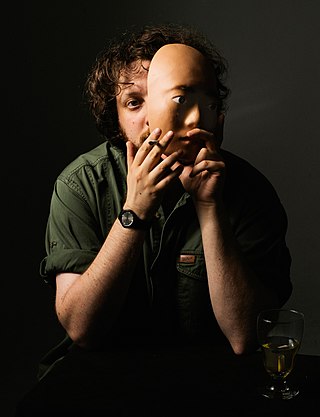
Daniel Lopatin, best known as Oneohtrix Point Never or OPN, is an American experimental electronic music producer, composer, singer, and songwriter. His music has utilized tropes from various musical genres and eras, sample-based composition, and complex MIDI production.

Mexican Summer is an independent record label founded in 2009 by Keith Abrahamsson and Andres Santo Domingo. Based in Brooklyn, New York, the label has released recordings from artists including Best Coast, Kurt Vile, Ariel Pink, Allah-Las, Weyes Blood, Connan Mockasin, Jessica Pratt, and Cate Le Bon. The label is named after the song "Mexican Summer" by Marissa Nadler.
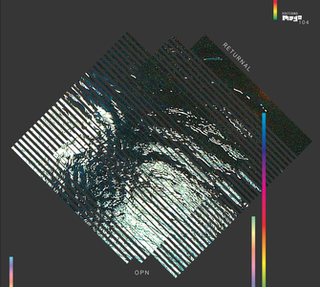
Returnal is the fourth studio album by American electronic musician Daniel Lopatin under the alias Oneohtrix Point Never, released on June 22, 2010 by Mego Records. It develops the synthesizer-based compositions of Lopatin's previous work, while also incorporating elements of noise music and his own processed vocals. The album received positive reviews from critics, and was named among the best albums of 2010 by several publications, including Fact, The Wire, and Tiny Mix Tapes.

Replica is the fifth studio album by American electronic musician Daniel Lopatin under the stage name Oneohtrix Point Never, released on November 8, 2011 via Mexican Summer and Software. It features co-production by Joel Ford and Al Carlson, and was Lopatin's first work to be recorded in a studio. Stylistically, the album marks a shift away from Lopatin's previous synth-based works under the alias, instead showcasing a sample-based approach utilizing audio from 1980s and 1990s television advertisements.

James Ferraro is an American experimental musician, producer, composer and contemporary artist. He has been credited as a pioneer of the 21st century genres hypnagogic pop and vaporwave, with his work exploring themes related to hyperreality and consumer culture. His music has drawn on diverse styles such as 1980s electronic music, easy listening, drone, lo-fi, sound collage, and R&B.
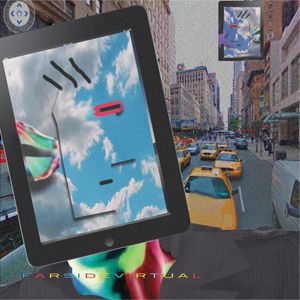
Far Side Virtual is a studio album by American electronic musician James Ferraro, released on October 25, 2011 by Hippos in Tanks. Conceived as a series of ringtones, the album marked Ferraro's transition from his previous lo-fi recording approach to a sharply produced, electronic aesthetic that deliberately evokes sources such as elevator music, corporate mood music, easy listening, and early computer sound design. The album has been interpreted as engaging with themes such as hyperreality, disposable consumer culture, 1990s retrofuturism, advertising, and musical kitsch.

Ducktails is a solo project led by American songwriter and guitarist Matt Mondanile, started in 2006.

R Plus Seven is the sixth studio album by American electronic musician Oneohtrix Point Never, released on September 30, 2013, as his debut album on Warp Records. The album's musical palette draws heavily on the synthetic sounds of MIDI instruments, 1980s synth presets, and VSTs.

Channel Pressure is the debut studio album of electronic music duo Ford & Lopatin, consisting of producers Daniel Lopatin and Joel Ford. Following the group's abandonment of their previous name "Games" for legal reasons, they recorded the album at Gary's Electric Studios in Brooklyn, New York. It was released on June 7, 2011 as the first album to be issued on Software, Lopatin's own label under the Mexican Summer imprint.

That We Can Play is the debut EP of the American electronic-music project Games, consisting of producers Daniel Lopatin and Joel Ford. Lopatin and Ford produced That We Can Play in an apartment studio, using vintage synthesizers and sequencers to recapture the sound and style of 1980s power pop.

Garden of Delete is the seventh studio album by American electronic musician Oneohtrix Point Never, released on November 13, 2015 on Warp Records. The album—which critics regarded as being radically stylistically different from his previous releases—was preceded by an enigmatic Internet-based promotional campaign, and draws on influences such as grunge music and nu metal, top 40 radio cliches, and themes of adolescence, mutation and abjection. It received generally positive critical reception and was included on year-end lists by several publications, including PopMatters, Fact and The Quietus.
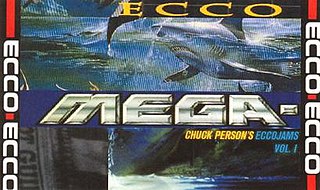
Chuck Person's Eccojams Vol. 1 is a 2010 album by American electronic musician Daniel Lopatin under the pseudonym Chuck Person. An album of plunderphonic chopped and screwed remixes, Eccojams Vol. 1 features songs that consist of looped samples of popular songs from the 1980s and 1990s, with effects such as reverb and pitch shifting being applied. The results tend to highlight mournful or existential lyrics from its sampled sources.
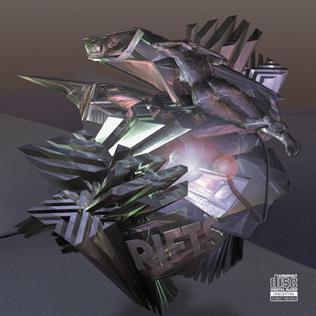
Rifts is a 2009 compilation album by Oneohtrix Point Never, the solo alias of Brooklyn electronic musician Daniel Lopatin. The album collects Lopatin's early synth-based recordings under the moniker dating back to 2003, including the three limited-run LPs Betrayed in the Octagon (2007), Zones Without People (2009) and Russian Mind (2009), as well as several additional cassette and CD-R releases. It was originally released on No Fun Productions in 2009 as a 2 disc set.

Daniel Lopatin is a Brooklyn-based experimental musician who records primarily under the pseudonym Oneohtrix Point Never. Early in his career as both a solo artist and as a member of several groups, he released a number of LPs and extended plays on a variety of independent labels. In 2010, he signed to Editions Mego and released Returnal. In 2011, he founded the record label Software. In 2013, Lopatin signed to British electronic label Warp Records and released his label debut R Plus Seven.

Music For Reliquary House / In 1980 I Was A Blue Square is a split album by American electronic musician Daniel Lopatin, known by his stage name Oneohtrix Point Never, and Rene Hell, the project of American electronic music artist Jeff Witscher. It showcases Lopatin's and Witscher's shift from the style of their early synthesizer-heavy recordings to electroacoustic music. The split album was released by NNA Tapes on September 17, 2012 to favorable opinions from professional reviewers.

Good Time (Original Motion Picture Soundtrack) is a soundtrack album by electronic musician Oneohtrix Point Never, containing the score for the Safdie brothers' 2017 film Good Time. It was released on August 10, 2017 via Warp Records.

Age Of is the eighth studio album by American electronic producer Oneohtrix Point Never, released on June 1, 2018 on Warp Records. Recorded over two years, it is the first Oneohtrix Point Never album to prominently feature Daniel Lopatin's own vocals. The album was accompanied by the MYRIAD tour, which premiered as a "conceptual concertscape" in 2018 at the Park Avenue Armory and ended its run in 2019.

Magic Oneohtrix Point Never is the ninth studio album by American electronic producer Daniel Lopatin, under his alias Oneohtrix Point Never, released on October 30, 2020, via Warp. The album draws on a psychedelic radio aesthetic strongly inspired by Magic 106.7, the mondegreen namesake of Lopatin's project, and was recorded during COVID-19 lockdowns, between March and July 2020.
